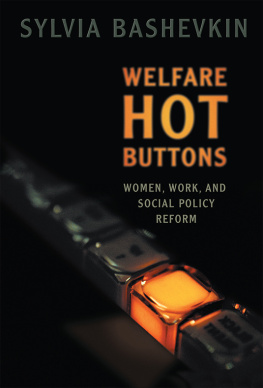WELFARE HOT BUTTONS:
WOMEN, WORK, AND SOCIAL POLICY REFORM
Welfare Hot Buttons provides a comparative assessment of contemporary social policy change in three Western countries: Canada, the United States, and Great Britain. In this challenging work, Sylvia Bashevkin examines the effect of the social policies of three Third Way political leaders Bill Clinton, Jean Chrtien, and Tony Blair on the fate of single mothers on social assistance. She argues that despite seemingly progressive campaign rhetoric, the social policies implemented under each of these leaders were in many respects more punitive and restrictive than those of their neo-conservative predecessors in the 1980s. During this latter period social assistance policy moved toward selective targeting of work-tested and means-tested benefits to deserving persons. Designed as tax or fiscal measures, these benefits helped to establish an individualized and marketized system of support that was directed toward rewarding working families. In effect, single mothers in all three countries were now required to enter the labour force while their children were still young, and the social citizenship of childless people and of adults who did not or could not work for pay was severely compromised.
Bashevkin addresses a number of other contentious issues while exploring the implications of the erosion of traditional social welfare programs in Britain and North America. In its comparative approach and substantive analysis, Welfare Hot Buttons makes an important contribution to the existing body of literature on social policy.
SYLVIA BASHEVKIN is Director of the Canadian Studies Program and a professor in the Department of Political Science at the University of Toronto. She specializes in the Areas of women and politics, public policy, and comparative politics.
ALSO BY SYLVIA BASHEVKIN
Toeing the Lines: Women and Party Politics in English Canada (1985, 1993)
True Patriot Love: The Politics of Canadian Nationalism
Women on the Defensive: Living through Conservative Times
Women and Politics in Western Europe, ed.
Canadian Political Behaviour, ed.
Womens Work Is Never Done, ed.
SYLVIA BASHEVKIN
Welfare Hot Buttons: Women, Work, and Social Policy Reform
UNIVERSITY OF TORONTO PRESS
Toronto London
UNIVERSITY OF PITTSBURGH PRESS
www.utppublishing.com
University of Toronto Press Incorporated 2002
Toronto London
Printed in Canada
ISBN 0-8020-3716-X (cloth)
ISBN 0-8020-8517-2 (paper)

Printed on acid-free paper
Published in the United States in 2002 by University of Pittsburgh Press, Pittsburgh, Pa. 15260. A United States CIP record is available from the Library of Congress.
ISBN 0-8229-5799-X
National Library of Canada Cataloguing in Publication
Bashevkin, Sylvia B.
Welfare hot buttons : women, work, and social policy reform / Sylvia Bashevkin.
Includes bibliographical references and index.
ISBN 0-8020-3716-X (bound). ISBN 0-8020-8517-2 (pbk.)
1. Public welfare-Canada. 2. Public welfare United States. 3. Public welfare Great Britain. 4. Single mothers Government policy Canada. 5. Single mothers Government policy United States. 6. Single mothers -Government policy Great Britain. 7. Canada Social policy. 8. United States Social policy. 9. Great Britain Social policy. I. Title.
HV31.B37 2002 361.65 C2002-901741-6
This book has been published with the help of a grant from the Humanities and Social Sciences Federation of Canada, using funds provided by the Social Sciences and Humanities Research Council of Canada.
The University of Toronto Press acknowledges the financial assistance to its publishing program of the Canada Council for the Arts and the Ontario Arts Council.
University of Toronto Press acknowledges the financial support for its publishing activities of the Government of Canada through the Book Publishing Industry Development Program (BPIDP).
Contents
Acknowledgments
For some time, this study has been nicknamed the How Could They project. My provisional or working title was offered only partly in jest, in response to enquiries from friends and colleagues about what I was working on. The phrase reflected a profound frustration and disappointment with the social policy directions of Third Way national leaders, particularly in the United States and Canada. As readers will note in the pages that follow, the passage of time seemed only to sharpen my sense of being let down.
Thankfully, in every respect other than the real-world political one, the experience of undertaking this study was positive and uplifting. I learned a great deal from activists and experts working on welfare reform issues in the United States, Canada, and Great Britain, and was inspired by the commitment of so many people to embattled ideals of equality and social justice. Given the constraints of contemporary research ethics, the more than 120 helpful interviewees who were willing to speak with me remain anonymous in this account.
The challenge of preparing a cross-national and cross-time study of social policy development was aided immeasurably by the contributions of a series of assistants at the University of Toronto, notably Cheryl Collier, Gina Cosentino, Tristan Fehrenbach, Joy Fitzgibbon, Jessie Fyfe, Helen Giddings, Genevieve Johnson, Jacqueline Krikorian, and Heather Murray. Research for the study was funded by a grant from the Social Sciences and Humanities Research Council of Canada (SSHRCC), and this book was published with the help of a grant from the Humanities and Social Sciences Federation of Canada, using funds provided by SSHRCC.
I am especially grateful for the ongoing interest of colleagues and students near and far. Since 1998, materials from this study have been presented at conferences of the Canadian Political Science Association, the Harvard University Center for European Studies, the York University Centre for Feminist Research, and the International Political Science Association, as well as at invited sessions at the University of Toronto, Queens University, the University of Western Ontario, Canada House in London, Mount Allison University, the Hebrew University of Jerusalem, Tel Aviv University, the University of North Carolina (Chapel Hill), McGill University, City University of New York Graduate Center, and the School of Public Policy and Social Research at UCLA. For their kind hospitality at these various venues, my warmest thanks to Richard Simeon, Thelma McCormack, Keith Banting, George Perlin, Paul Nesbitt-Larking, Andrew Nurse, Arie Schachar, Hanna Herzog, Gary Marks, Antonia Maioni, Joyce Gelb, and especially Barbara J. Nelson. I genuinely appreciate the questions, comments, and suggestions offered by so many insightful listeners in all of these places.
Preparing the manuscript was made easier and more pleasurable by the cooperative efforts of many colleagues. Six contributors to a comparative volume on social policy development taught me a great deal about the field; they are Maureen Baker, Dionne Bensonsmith, Jane Jenson, Gwendolyn Mink, Selma Sevenhuijsen, and Leah Vosko. For their willingness to share important source materials, I am grateful to Gerard Boychuk, Ran Hirschl, Ruth Levitas, Ruth Lister, Don Moggridge, Alain Nol, Julie Simmons, Donley Studlar, and Kent Weaver. As chair of the Department of Political Science at the University of Toronto, Robert Vipond secured a half-sabbatical during which I wrote the first draft.
Virgil Duff, my editor at the University of Toronto Press, has been witty, helpful, and committed throughout the publication process. The referees who assessed the manuscript offered a wealth of constructive commentary in their reports. Early versions of some of this research were published in articles in the
Next page











